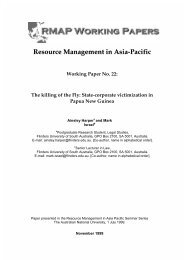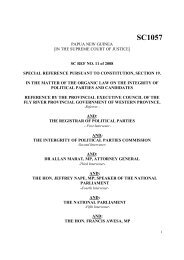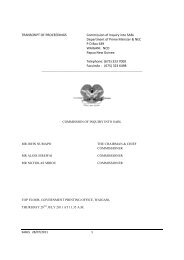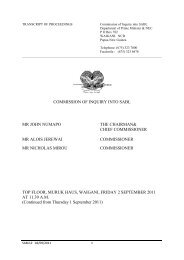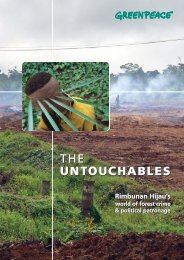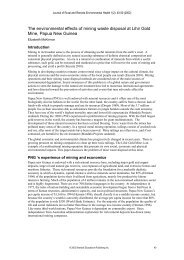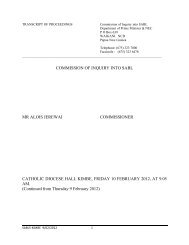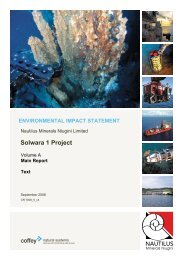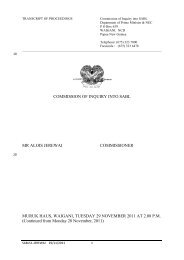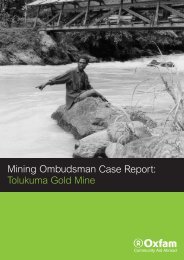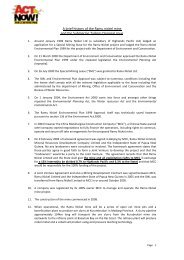Fishy business. The Social Impact of SST.pdf - Act Now!
Fishy business. The Social Impact of SST.pdf - Act Now!
Fishy business. The Social Impact of SST.pdf - Act Now!
You also want an ePaper? Increase the reach of your titles
YUMPU automatically turns print PDFs into web optimized ePapers that Google loves.
When we asked if this meant sporting sponsorships, he said, “No, but I mean we get involved inthe community as much as we can. Our cafeteria buys supplies locally…so it’s…some <strong>of</strong> thelocal <strong>business</strong>es in PNG we buy a lot <strong>of</strong> parts from.”What is “read into the commodity” varies across positions in global trade (Appadurai 1986:41).Commodities have life cycles, and these reflect the historical and political relations that gobeyond supply and demand. NTCs are powerful symbols <strong>of</strong> monopoly capital in the global age,and their global relations are complex: cut flowers from South America flown to markets inNew York; children toiling away at sub-minimum wages to make $250 Nike running shoes;Brazil nuts from the Amazon garnishing cakes in a Parisian bakery; and so forth. Closer tohome we see villagers on Baluan Island, Manus Province, selling mounds <strong>of</strong> fresh pineapples atmarket, to raise the fare for a boat ride to Lorengau, where they splurge on tins <strong>of</strong> Dolepineapples. <strong>The</strong> global marketplace does not mean people are ‘free’ to make the same choiceseverywhere. Workers may have limited employment options, just as consumers can only make‘choices’ in accord with their wages. <strong>The</strong> affluent continue to define the conditions and values<strong>of</strong> the poor, as critics <strong>of</strong> globalization would say. <strong>The</strong> production <strong>of</strong> NTCs may in fact degradethe standard <strong>of</strong> living in a host community. A minority <strong>of</strong> farmers may be favored or ignored,local subsistence resources depleted, and the overall income (and social well-being) <strong>of</strong> acommunity depressed.Landowners are aggrieved by the alo<strong>of</strong>ness <strong>of</strong> <strong>SST</strong> as much as by anything else. Meni andKreer people understand the issue <strong>of</strong> State land and rent being taken by the Harbour’s Boardwithout any payment to them. <strong>The</strong>y are clear that the problem predates <strong>SST</strong>C, and thatcompensation might and should have been paid when the land was transferred from customaryto Statehold. But they are perfectly aware that they are in no way favoured for employment orspin-<strong>of</strong>fs <strong>of</strong> any kind. <strong>The</strong> Suare 2 Villagers are much more justifiably angry at the way they’vebeen treated: first cultivated and ‘greased’, then encouraged to invest their own moniesregistering <strong>business</strong> associations and preparing for the factory, they were summarily droppedwhen the better site became available.<strong>The</strong>re are environmental questions to be answered still. Why are patches <strong>of</strong> oil and debris seenfloating near the shores <strong>of</strong> Wewak almost every day? What effect does the nauseating smellhave on peoples’ health?<strong>The</strong> shady ownership <strong>of</strong>f <strong>SST</strong> only reflects the entire climate <strong>of</strong> Wewak <strong>business</strong>, where arms <strong>of</strong>government and free enterprise are not only encouraged to be intertwined, but appear to be thesame. This is not about privatization <strong>of</strong> government assets, but about wholesale flogging <strong>of</strong>public resources for the benefit <strong>of</strong> a very few.Labour issues are thorny. <strong>The</strong> pay is astonishingly low, and the conditions strenuous andunsafe. Of course market logic will win out, and eventually workers will realize the price <strong>of</strong>standing eight to ten hours a day for a fortnight’s pay that’s less than a good day in the market istoo high. As it is, they are giving the factory good labour for almost nothing, confused by theidea that development and wage labour is always better than an informal economy. Some aregrowing cynical, resenting the fact that they seem to be toiling to make a few rich men thatmuch richer. How long will it take them to figure out that capitalism has no natural quid proquo? That no one will thank or donate or organize or even think twice about their contributionto ‘provincial development.’167



